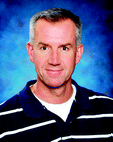DOI: 10.1039/C4CC90046D
(Profile)
Chem. Commun., 2014, 50, 3123-3124
Interview with Cameron Jones
|
Professor Cameron Jones obtained his BSc (Hons) degree from the University of Western Australia (1984). He carried out his PhD studies at Griffith University, Brisbane, under the supervision of Professor Colin L. Raston (1989–1992), followed by postdoctoral work (1992–1994) with Professor John F. Nixon FRS, Sussex University. He was appointed Lecturer at The University of Wales, Swansea (1994), before moving to a Readership at Cardiff University (1998). There, he was promoted to a Personal Chair in 2002. In 2007 he moved to Monash University, Melbourne, where he is currently Professor of Chemistry. He has been the recipient of a number of awards, most notable of which are the Main Group Chemistry Prize of the RSC (2004), the Senior Research Prize of the Alexander von Humboldt Foundation (2008), and the Burrows (2011) and HG Smith (2013) Awards of the Royal Australian Chemical Institute (RACI). He is a Fellow of both the RSC and the RACI. His current research interests are wide ranging, with particular emphasis being placed on the fundamental and applied chemistry of low oxidation state s-, p- and d-block metal complexes, unusual metal–metal bonded systems, and metal hydrides. In these and related areas he has published more than 300 papers. |
Do you remember what it felt like to publish your first ChemComm article?
I do indeed. The first paper of my independent academic career was published in ChemComm (DOI: 10.1039/CC9960000631), and described cycloaddition reactions of arsaalkynes, As![[triple bond, length as m-dash]](https://www.rsc.org/images/entities/char_e002.gif) CR. The buzz I got from seeing that paper in print made me realize that I had chosen the right career path. I still get that buzz when we publish, what I consider to be, high profile papers.
CR. The buzz I got from seeing that paper in print made me realize that I had chosen the right career path. I still get that buzz when we publish, what I consider to be, high profile papers.
How has your research evolved from your first to your most recent article?
A large part of my career has involved research into the chemistry of the s- and p-block elements. Despite this, I have regularly changed the specific areas of research my group explore, though remnants of those areas are always carried forward into new projects. My basic approach has always been to identify compound classes that are generally thought incapable of existence, then to go out and make them. Just two examples I am particularly proud of are the first indium trihydride, InH3, complexes (first published in ChemComm), and the first stable magnesium(I) complexes. More and more in recent years I have begun to explore the potential applications of such systems to synthesis, catalysis etc.What do you like most about publishing in ChemComm?
First of all, ChemComm is regarded as one of the premier general chemistry journals by chemists of all persuasions, from right around the globe. This is important as you need a broad audience for your work to be recognised and cited. Furthermore, publishing in ChemComm. is rapid and straightforward. The whole process is professional and pain free.What aspect of your research are you most excited about at the moment?
Currently, we are investing a lot of effort into developing the “transition metal-like” chemistry of very low oxidation state main group complexes. The ultimate goal here is to install cheap, non-toxic and earth abundant main group elements as replacements for expensive, toxic and increasingly scarce late transition metals in a variety of synthetic and catalytic processes. While this is a “big ask”, excellent progress has been made in the area by a number of groups (hopefully including ours) from around the world over the past few years. I believe that within five years low oxidation state main group compounds will be commercialised for this task.What is the best part of your job?
There are many great aspects to being an academic, and some (mainly involving the university administration) that are not so great! The most enjoyable aspect for me is, and always has been, writing papers. We have the privilege of being able to freely explore what chemistry we want to, and we should communicate the results of that. I think there is a lot of truth to the adage that “if something isn't published, it never happened”. I also really enjoy collaborating with scientists from around the world, many of whom have become close friends. Of course, interacting with enthusiastic and intelligent research students on a daily basis keeps you young, if only on the inside.What is the secret to success in scientific publishing?
Tell a good story.What is your advice to young emerging scientists?
Have the belief and tenacity to do the research you want to do. Make sure you are breaking new ground, and don't take the easy path with the rest of the herd. It will pay off in the long run.What do you do in your spare time?
Having grown up near the beach in Perth, Western Australia, I have always loved the ocean. When I have time, I swim and explore the beautiful coastline of Victoria.By the time I'm 100 I would like to have…
a heartbeat.| This journal is © The Royal Society of Chemistry 2014 |

